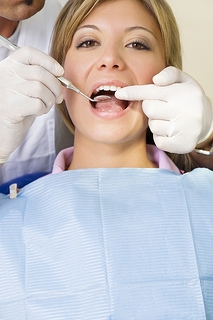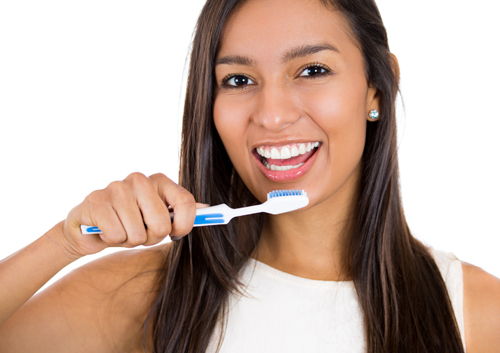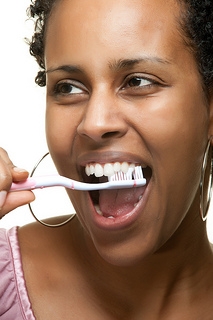My child has autism. What should we expect at your office?
June 10th, 2015

At Kenneth Sloane, DDS, we know that as many as one in 88 children today have some form of autism, a complex brain disorder that affects a child's ability to communicate or form relationships, and makes a child appear distant, aloof, or detached from other people or surroundings. Autism varies widely in symptoms and severity, and some people have coexisting conditions such as intellectual disability or even epilepsy.
That is why Dr. Kenneth Sloane and our team are specially trained to provide dental care to the entire special needs community, including autistic children. We know that a visit to the dentist with an autistic child can be difficult. In addition to the common fears associated with strangers, there are also unfamiliar sounds, sensations, bright lights, and tastes with which your child may not be comfortable. We work with parents to make sure visiting the dentist is not so traumatic for our autistic patients.
Dr. Kenneth Sloane and our team also know that patients with autism may be more interested in equipment and instruments than in us. We show our patients every piece of equipment we are going to use in a way that they can understand. We also allow a patient to sit in a parent's lap in the open bay if he or she is not feeling at ease. We want your child to enjoy getting to know us and to be comfortable while under our care.
A pleasant, comfortable visit at our Closter, NJ office builds trust and helps put your child at ease for future appointments. Before a visit, we ask parents or guardians to bring their child's favorite toy, comfort item, music, or other coping device their child requires. We have a caring and compassionate team and know how to help autistic children acclimate themselves to a dental environment. We may not get everything done at the first visit, but we are able to schedule several appointments so that your child can get used to our office, the dentist, instruments, and our staff.
Children, especially those afflicted with autism, are not born with a fear of the dentist, but they can fear the unknown. Our team at Kenneth Sloane, DDS genuinely cares for our patients beyond their teeth, and are more than happy to discuss any concerns you may have, as well as answer questions about your child's ongoing dental treatment. Please give us a call to learn more or schedule an appointment with Dr. Kenneth Sloane.
June is National Smile Month: Show off your smile!
June 3rd, 2015

The community health awareness group Oral Health America has reported that 82 percent of adults are unaware of the role that infectious bacteria can play in tooth decay or cavities, and almost three out of five children aged 12 to 19 have tooth decay. Since June is National Smile Month, Dr. Kenneth Sloane and our team at Kenneth Sloane, DDS thought we’d remind our patients about the importance of good oral hygiene visits between office visits.
To keep your family’s smiles healthy and beautiful for years to come, be sure to:
- Brush at least twice a day with fluoride toothpaste
- Floss every day to clean between your teeth
- Eat a healthy, well-balanced diet
- Reduce your intake of sugary foods and drinks
- Visit Dr. Kenneth Sloane for scheduled appointments
If you want to know more about healthy home care habits, feel free to ask our team at your next appointment, or ask us on Facebook!
Do I lose my wisdom if I lose my wisdom teeth?
May 27th, 2015

The third molars have long been known as your “wisdom teeth,” because they are the last teeth to erupt from the gums – usually sometime during the late teens to early twenties. This is a time in life that many consider an “age of wisdom”; hence the term, “wisdom teeth.”
Extracting the third molars does not have any effect on your actual wisdom … and Dr. Kenneth Sloane and our staff are sorry to say that holding on to them can’t make you smarter, either. So if you somehow feel that you became wiser and smarter when your wisdom teeth appeared, chalk it up to age rather than teeth.
In fact, you may just be showing how smart you are by having your wisdom teeth removed. Mankind once relied on the wisdom teeth to replace teeth that were damaged or missing, thanks to a poor diet. But dietary changes and advances in modern dentistry make it possible for many people to hold on to their teeth for many decades, which eliminated the need for third molars.
For many people, wisdom teeth cause nothing but problems: becoming impacted, irritating surrounding gum tissue, or even causing other teeth to become crooked or overlap. By removing them, patients often enjoy a lower risk of decay, infection, and aesthetic complications.
So rest assured that extracting your wisdom teeth will have no effect on your immediate or long-term intelligence.
Memorial Day
May 21st, 2015

Memorial Day is not only a federal holiday in the United States, but it is a day of observance and remembrance of those who died in service. Originally known as Decoration Day, this solemn day has been marked on calendars since the end of the American Civil War as a day to commemorate both the Confederate and Union soldiers who fought and died in the war.
Marking the graves of fallen soldiers with flowers, wreaths, or other tokens has been practiced throughout history, but it wasn't until the mark of the end of the Civil War that a special day was decided upon as the one to spend in remembrance. By 1890, every state in the country was observing Decoration Day. It wasn't until 1967 when the name formally changed from Decoration Day to Memorial Day, in order to encompass all fallen American soldiers in all wars and conflicts. In June of 1968, Congress moved the official date of Memorial Day to the last Monday in May in order to create a three day weekend.
Today, while there is certainly an air of remembrance on Memorial Day, it has become more a day of spending time with family, friends, and other loved ones. This day is also heralded as the start of summer, with many schools finishing for the year around this time. Our team at Kenneth Sloane, DDS remembers it as a day to take solace and remembered those lost.
Traditional observances of Memorial Day are still held, and they often involve raising the American Flag then lowering it to a half-staff position until noon, and then raising it once again to its full height afterwards. The flag is lowered to remember those who've lost their lives while in service to their country, and then it is raised to signify our willingness to not let their sacrifice be in vain.
From community parades in the Closter, NJ area, backyard cook-outs, and fireworks to formal ceremonies, Memorial Day is commemorated in many different ways. No matter how you choose to spend this day, take a moment to remember those who've lost their lives in an effort to preserve our freedom.
How do OTC whitening treatments compare to in-office whitening?
May 13th, 2015

If you are unhappy with the color of your teeth, teeth whitening may be an excellent choice for you. Many patients of Dr. Kenneth Sloane suffer from darkened teeth due to the natural aging process, regular consumption of coffee or tea, or nicotine staining from cigarettes.
Some people may have darkened teeth due to long-term use of medication. Certain medication-related stains on the teeth cannot be lightened, but virtually every other type of teeth stains can be effectively lightened using either professional dental whitening or at-home whitening.
While both types of whitening have benefits, at-home kits are less expensive and less effective overall. Professional teeth whitening is a highly effective option, but it requires a bit more of an investment. Here is the basic info on each type of whitening.
At-Home Whitening
At-home whitening is done in a number of different ways today. Some of the most popular options include:
- Whitening strips that are applied to teeth and then removed after a specified period. These will typically be used once a day for at least a week.
- Whitening gels or pastes that are placed in a one-size-fits-all plastic tray. These trays are worn, retainer style, for a set period of time once a day.
- Whitening toothpaste, which is used daily, and whitening mouthwashes are also available today. These products require constant use to realize results.
In-Office Whitening
In-office whitening is the fastest way to achieve whiter teeth. If you want an almost immediate difference in the color of your teeth and their overall appearance, this is probably the option for you.
Dr. Kenneth Sloane will typically apply the whitening formula directly to your teeth. Following the application, we will have you relax in our office between half an hour and an hour.
Some office-whitening formulas are strengthened with the use of heat, specialized lighting, or laser application. Patients will usually notice whitening results after only one application, but it usually takes at least a few appointments at Kenneth Sloane, DDS to notice a truly dramatic change in tooth color.
Wishing all our moms a happy Mother’s Day!
May 6th, 2015

"Motherhood: All love begins and ends there." - Robert Browning
We would like to take this moment to thank all the great moms out there for being so great during their child’s visits to Kenneth Sloane, DDS. Whether it’s driving their kids to regularly scheduled appointments or for “being there” while their child is treatment, the moms who come to our office are all stellar individuals, so Dr. Kenneth Sloane and our entire staff would like you to know that we appreciate you all!
Happy Mother’s Day and enjoy your special day!
Dental Anxiety
April 29th, 2015

If you suffer from dental anxiety, a visit to Kenneth Sloane, DDS might seem like a daunting prospect. Perhaps you had a bad experience in the past, but whatever the reason, please know that at our Closter, NJ office, there is nothing to be afraid of. We understand you may be anxious about receiving dental treatments, and we’re here to help you have a comfortable, pain-free experience that will put your fears to rest.
You’re not alone!
A 1984 study that appeared in the Journal of the American Dental Association reported that up to 75% of all adults in the United States have some degree of dental anxiety. This includes five to ten percent whose dental anxiety is so severe that they try to avoid a dentist’s office at all costs.
Treatment
If you experience dental anxiety, it is important to let our office know in advance, so we can provide you with the dental care you need with an added touch of TLC. We can assist by explaining behavioral techniques for relaxation, by administering nitrous oxide (laughing gas), or by prescribing a relaxing medication prior to your dental procedure.
Every Day is Earth Day
April 22nd, 2015

During the early days of the environmental awareness movement, those who demonstrated against pollution, toxic chemicals, and the general public health were known as hippies. The early 1970s were a time of change, and assertions that we needed to pay more attention to the Earth's atmosphere were generally dismissed. But within a couple decades, it had become clear that the previous generation was right; the citizens of the world needed to become more environmentally conscious.
Many people feel that they can't make a difference if they don't do something big. But caring for the environment doesn't have to be an all-or-nothing concept. In fact, the little things you do can add up to make a great impact, especially in our community. Here are a few ways you can help the environment on Earth Day, April 22nd and all year around.
Four Small Ways to be Environmentally Friendly
- Recycle Your Textiles. Nearly 21 million tons of textiles are added to American landfills each year, according to the Environmental Protection Agency. Donating your unwanted clothing to a secondhand store or an organization that repurposes fabric helps cut down on solid waste and conserves natural resources.
- Reduce Usage of Disposables. Plastic bottles and bags, disposable diapers and other things we can use and toss out are convenient, but they're not necessary. Simply choosing to replace one of type of disposable with a reusable product can help you cut down on waste that has a large negative impact on our environment.
- Conserve Water. If everyone in the United States turned off the water while brushing their teeth, more than 1.5 million gallons of water could be conserved. Turn the water on long enough to wet your toothbrush for brushing and rinsing, and then immediately turn the water off again.
- Turn Off the Lights. Flip the light switch to "Off" if you're going to leave a particular room for 15 minutes or more. This will conserve energy on incandescent light bulbs and cut down on cooling costs.
It's not necessary to be an activist or install solar panels all over your home to help the environment. Although you can do these things, the little everyday measures make a big difference in helping to conserve energy and the environment, while reducing your carbon footprint. Our team at Kenneth Sloane, DDS wants to remind you to celebrate Earth Day and help the environment, knowing that it will benefit your and your children's generation.
Common Emergency Care Visits: Toothaches or abscesses
April 15th, 2015

Dental problems do not always wait for normal office hours. Broken fillings or damaged teeth are common reasons for emergency treatment. Toothaches and abscesses can also require prompt attention. Dr. Kenneth Sloane can provide you with the information and treatment you need to prevent the problem from becoming worse. Emergency dental care is only a phone call away, 24 hours a day, seven days a week.
Abscess
An abscess is a bacterial infection, and will normally cause pain and swelling around the affected tooth and gum area. Antibiotics are not always necessary, but you should seek treatment quickly. Left untreated, an infection can spread and cause serious complications.
Toothache
There are many reasons that you may develop a sudden toothache. The cause of the pain may be a particle of food lodged between your tooth and gum line. One of the first steps you can take is to rinse your mouth with warm water. You may also try gently flossing the area to dislodge the particle. Do not continue flossing if bleeding occurs.
Toothaches can occur from a carie — a cavity in the tooth — or from a fracture. Sensitivity to heat or cold may also cause tooth pain. You should make an appointment to ensure that a minor problem does not become serious. We may recommend acetaminophen or another pain reliever to reduce the pain before your visit.
Additional tips and treatments:
- If you have fractured a tooth, rinse the area with warm water to keep the surfaces clean. Apply a cold compress to the outside of your facial area to reduce swelling.
- A tooth that has been knocked out should be kept moist, in a clean container, until you can receive treatment.
- Do not apply aspirin directly on a damaged tooth or gum area as it can cause tissue irritation.
- If you suspect that your jaw has been broken, go to an emergency room immediately.
- If you have bitten or damaged your lips or tongue, rinse your mouth well with warm water. If bleeding continues, call us or seek other medical attention immediately.
Our team at Kenneth Sloane, DDS is ready to assist you when you have an emergency dental need. When you call, please provide us with as much information as possible so we can offer recommendations that will assist you until your appointment. Do not delay; emergency treatment is available and immediate treatment is the best course of action.
Dental Veneers
April 8th, 2015

Are you looking to improve the appearance of your front teeth? Dental veneers are widely used to improve the appearance of front teeth and are a much more conservative option than a full dental crown. Veneers can be used to improve the appearance of staining, large gaps, large fillings, chipped teeth, or overall shape. Veneers are a thin covering over the front and biting end of the tooth used to restore the beauty of a smile. Over the years we have helped many patients who opted for veneers and now have the confidence to smile again.
Dental veneers are made in a lab from long-lasting porcelain materials. The shade can be chosen to a desirable color to whiten the appearance of your smile. Dental veneers are usually placed on the anterior, or front teeth, where the chewing forces are not as hard as the back teeth. The process of placing veneers is relatively easy requiring only two dental appointments. In some cases, only one appointment is needed. It depends on the fabrication process.
The first appointment is to “prep” the teeth and take an impression to be sent to a lab to fabricate the veneers. Veneers are fairly conservative in the preparation as it requires a small amount of space to be created on the face (front), bottom, and sides of each tooth to allow space for the veneer to be placed and look natural. You will leave the office with temporary veneers for the next week or two while the permanent veneers are being made.
The second appointment is to place the veneers and make minor adjustments if needed. What a difference it makes in the appearance of the teeth! If you’re interested in learning more, give Dr. Kenneth Sloane a call today!
April is National Facial Protection Month
April 1st, 2015

The Importance of Facial Protection
Americans from all walks of life should mark April as National Facial Protection Month on their calendars. The American Association of Pediatric Dentistry, Academy for Sports Dentistry, American Academy of Pediatric Dentistry, and American Association of Oral and Maxillofacial Surgeons have combined forces to sponsor this annual campaign, which aims to educate and remind us of the importance of protecting our face and teeth against impacts and injuries.
Wearing a helmet can save your life and prevent devastating physical damage in a variety of situations, from playing football to riding a bicycle. According to the American Association of Oral and Maxillofacial Surgeons, helmets reduce the risk of various head injuries by as much as 85 percent. Whether helmet laws apply in your area or not, Dr. Kenneth Sloane and our team at Kenneth Sloane, DDS want you to make sure you and your loved ones wear helmets with the appropriate safety ratings for specific activities. (A sticker on or inside the helmet will usually indicate this rating.) Helmets can also help save your teeth if they come with an attached faceguard, an essential addition for football players and others involved in contact sports.
Preventing Dental Injuries
A mouthguard can protect you against a variety of dental injuries, such as cracked, broken, or knocked-out teeth. The American Dental Association states that mouthguards play an essential role in preventing up to 200,000 dental injuries each year, and many states mandate their use for sports activities such as football and hockey. The Academy for Sports Dentistry warns, however, that these mouthguards must be custom-fitted as precisely as possible to prove effective. Have a professional-quality mouthguard molded and fitted by our team at Kenneth Sloane, DDS for better protection than a generic store-bought or “boil-and-bite” variety can offer. These cheaper versions tend to wear out quickly, interfere with proper breathing, and provide uneven degrees of cushion against impacts. Always have a fresh mouthguard fitted for each new sports season.
Choose the right combination of helmet, faceguard, and mouthguard to protect your teeth and face this April, and tell your friends to do the same! To learn more about mouthguards, or to schedule an appointment with Dr. Kenneth Sloane, please give us a call at our convenient Closter, NJ office!
HPV and Oral Cancer
March 25th, 2015

Human papillomavirus, or HPV, is best known as a sexually transmitted infection. In the United States, HPV is the most common sexually transmitted disease, with 79 million Americans currently infected, according to the Centers for Disease Control and Prevention. In addition to increasing risk for cervical cancer, HPV is a contributing factor in some cases of oral cancer. Each year an estimated 1,700 women and 6,700 men develop oropharyngeal cancer, which affects the tongue and throat.
Connection between HPV and oral cancer
There are more than 40 strains of HPV that live in the skin and mucosal areas. Some of these affect the genitalia, while others are found in the mouth and throat. Of the strains of oral HPV, only one, called HPV16, increases the risk of oral cancer, the Oral Cancer Foundation reports. A retrospective study conducted found that oral cancer developed an average of 15 years after exposure to HPV, making it a relatively slow-growing form of cancer.
In general, 80% of Americans will have an HPV infection at some point in their lifetimes, while 99% develop no ill effects. Getting oral HPV is associated with multiple sexual partners and engaging in oral sex; however, even some individuals who have been with only one partner may contract the infection. Although overall risk of oral cancer from HPV infection is low, it is essential to be proactive about oral health.
How to prevent HPV-related oral cancer
Scientists continue to study how HPV infections lead to oral cancer, so little is known about the progression of the disease. However, one recent study found that poor oral health, including gum disease and poor oral hygiene, is associated with oral cancer risk. Thus, being vigilant about brushing and flossing your teeth regularly may reduce HPV-related oral cancer. Getting the HPV vaccine also protects against the oral form of the virus.
Another key way to reduce mortality from oral cancer is to have regularly scheduled appointments with at Kenneth Sloane, DDS. Having Dr. Kenneth Sloane examine your mouth at least two times a year increases the likelihood that a sign of oral cancer, such as a sore or patch, will be detected. If you’re concerned about HPV-related oral cancer, please give us a call at our Closter, NJ office for advice about oral hygiene and disease prevention.
What is gum disease?
March 18th, 2015

Gum disease, also called periodontal disease, is an infection of the gum tissues, and is something seen all too often by Dr. Kenneth Sloane. Extending from inflammation of the gums (gingivitis) to more serious infections and complications (periodontitis), there is a wide range of gum disease severity.
Not only does gum disease affect the health of your mouth and teeth, but according to the National Institute of Dental and Craniofacial Research, it can affect your general health as well. This is because an infection in the mouth as a result of gum disease can travel to other parts of your body through the bloodstream. Gum disease is also a risk factor for heart disease, and can play a role in blood sugar levels.
Causes and Risk Factors
Gum disease is essentially caused by the build-up of bacteria in your mouth. If you brush and floss every day, this bacteria is washed away, but if not, it turns into plaque. If left unchecked, this plaque buildup can lead to gum disease.
Some of the common risk factors for gum disease include not taking good care of your teeth, failing to have one’s teeth cleaned every six months, experiencing hormonal changes, smoking cigarettes, developing diabetes, being genetically exposed to gum disease, or taking certain types of medications.
Gingivitis versus Periodontitis
There are two main types of gum disease: gingivitis and periodontitis. Both are bad for you, but gingivitis is less severe. It is typically the first stage, and involves inflammation of the gums from plaque and tartar on the teeth. If your gums are swollen and bleed, this is a sign of gingivitis.
Periodontitis, a more severe case of gum disease, occurs when your gums pull away from the teeth and pockets form. These pockets are a concern because they can harbor infection.
Treatments for Gum Disease
Treatments for gum disease depend on the cause and severity. Deep cleaning to remove the plaque underneath the gum line – called root scaling and planing – is one of the most common treatments for gum disease. Antibiotics placed under the gums to rid you of an infection or reduce the inflammation may also be advised. In some cases, surgical procedures, including flap surgery and bone and tissue grafts, are needed.
If you have bleeding or swollen gums, pockets between your gums and teeth, pain, or other issues, you might have gum disease. Visit Kenneth Sloane, DDS for an exam and learn the best course of action.
St. Patrick's Day
March 11th, 2015

On March 17, everyone has a little Irish in them. St. Patrick’s Day is a joyous celebration of Irish heritage. The holiday originated as a commemoration of Saint Patrick, who brought Christianity to Ireland. The saint arrived in Ireland in 432 and earned the reputation of a champion of Irish Christianity. March 17th, the day of St. Patrick’s death, has been commemorated by the Irish for over 1,000 years. St. Patrick’s Day is still observed as a religious feast day by several Christian denominations, but it is better known in the public imagination as a rich celebration of Irish culture.
St. Patrick’s Day has been an official public holiday in Ireland since 1903. Each year, the Irish celebrate with a several-day festival that includes theater performances, music, fireworks, and festive parades. The celebration is also a public holiday in Northern Ireland, Montserrat, and Newfoundland and Labrador. In other parts of the world with heavy Irish populations, it is an unofficial celebration of Irish heritage. Parts of Great Britain, Canada, Argentina, South Korea, Switzerland, New Zealand, the United States, and Australia commemorate the holiday each year. Typical celebrations in these countries include drinking green beer, wearing green, eating traditional Irish foods, parades, and shamrock decorations.
Many people, Irish and non-Irish alike, take part in the “wearing of the green” on St. Patrick’s Day. In fact, the color originally associated with Saint Patrick was blue. His use of shamrocks to explain the Holy Trinity to the Irish made the green clover emblematic of the holiday, leading to the traditional green attire worn by thousands on St. Patrick’s Day. Other little-known facts about St. Patrick’s Day include the following:
- Each year, the United States and Ireland face off in a rugby competition called the “St. Patrick’s Day Test.”
- Montreal celebrates the holiday with an annual parade, which has been held each year since 1824. The Montreal city flag even features a shamrock in its corner, as a nod to its Irish heritage.
- The Guinness World Records named St. Patrick’s Day the “Friendliest Day of the Year.”
- Along with Valentine’s Day, St. Patrick’s Day is one of the most widely celebrated saint’s day in the world.
No matter your cultural heritage, St. Patrick’s Day is a great time to let loose and celebrate your inner Irish-ness! Don your greenest attire and exclaim “Erin go Bragh!” (Ireland forever!) to everyone you meet. From Dr. Kenneth Sloane - have a great St. Paddy’s day!
March is National Nutrition Month!
March 4th, 2015

While you don’t have to wait to start eating right, March is the month the Academy of Nutrition and Dietetics asks everyone to pay special attention to what goes into our bodies. The Academy has designated the month of March for focusing the public’s awareness on what they eat.
What Not to Eat
The academy points out that the foods you eat have a direct effect on the health of your teeth and specifically on tooth decay. Bacteria rely on carbohydrates to thrive. That is why Dr. Kenneth Sloane and our team at Kenneth Sloane, DDS tell our patients to cut back on both candy and sweets. They consist of simple sugars that feed the bacteria in your mouth and enhance tooth decay.
It’s the hidden sugars that will cost you, though. Get in the habit of reading labels on food and looking for products with added sugar. This includes ingredients that end with the suffix “ose.” When it comes to nutrition, these foods offer little value beyond satisfying that sweet tooth.
What You Should Eat
Turn to foods that not only taste good but are good for your teeth too. Dairy products, for example, provide the body with nutritional items that support tooth enamel. Foods high in protein feature phosphorus, a nutrient critical to oral health.
You can’t really go wrong by adding color to your diet, either. Fruits and vegetables make for a colorful plate and a healthy meal. Use some caution with acidic fruits like oranges or even tomatoes, because the acid can erode tooth enamel. It is better to include these foods in a meal instead of eating them by themselves.
Remember, good nutrition is something you should worry about all year long, not just when celebrating National Nutrition Month. March just serves as a fun reminder that eating right is a proactive step in managing your dental health.
We encourage you to give us a call at our Closter, NJ office to learn more!
The Importance of Baby Teeth
February 25th, 2015

Dr. Kenneth Sloane and our team know it can be easy to underestimate the significance of baby teeth. At Kenneth Sloane, DDS, we sometimes meet parents who assume that since their child's baby teeth, also known as primary teeth, eventually fall out and are replaced, they are less important. But did you know baby teeth serve purposes other than biting, chewing, and digesting food properly?
Baby teeth are essential not only for your child’s language development, but they also serve other important functions, like contributing to the normal development of your child’s jaw bones and facial muscles. Baby teeth also reserve space for your child’s future permanent teeth.
So, when do baby teeth fall out?
A baby tooth is intended to remain in your child’s mouth until the permanent tooth underneath it is ready to take its place. Sometimes, either due to a tooth being knocked out accidentally or being removed because of tooth decay, kids lose baby teeth before the permanent teeth are ready to erupt. If a tooth is lost, the teeth on either side of the open space may possibly push into the open space. The result? There may not be enough room for the permanent tooth when it is finally ready to erupt.
If you have any questions about your toddler’s teeth, or if your child is experiencing issues that concern you, please give us a call to set up an appointment at our convenient Closter, NJ office.
Should I have TMD treated? Why?
February 18th, 2015

TMD occurs when your bite is not properly aligned. It can cause the jaw to experience unnatural stresses and prevent it from resting properly when your mouth is closed. If you have TMD, you may have noticed a clicking noise when you chew, speak, or yawn; you may even experience pain and discomfort during these actions. In some cases, your jaw may feel “locked” following a wide yawn.
TMD can cause pain and discomfort in the jaw as well as headaches that occur when the muscles that help the joints open and close become overtired. But beyond the pain and discomfort, TMD can also cause serious dental problems if left untreated.
Because TMD is associated with a poor bite or malocclusion (which literally translated means “bad closure”), your teeth do not meet properly. As a result, extra tension and stress may be placed on your teeth, resulting in chips and cracks that allow cavities to form and may even result in tooth loss. Over time, TMD can cause teeth to break, which requires cosmetic treatment to rebuild your healthy smile, and ensure the broken tooth and its neighbors are protected from decay.
While treating TMD used to mean expensive and invasive surgery to reposition or even rebuild the jaw joints, today’s approach at Kenneth Sloane, DDS is much more patient-friendly. By restoring broken, chipped, or cracked teeth, replacing missing teeth, and using braces or other dental devices, Dr. Kenneth Sloane and our team can help realign your jaw so it’s able to function properly, and eliminate pain and discomfort. And there’s more good news: By restoring damaged teeth and tooth surfaces and straightening crooked teeth, you’re also left with a more attractive smile once treatment is completed.
Every patient is different, and that means your course of treatment will be different too. After a thorough examination of your teeth and jaw, our experienced staff at Kenneth Sloane, DDS will work with you to develop a treatment plan that will have you feeling better – and looking better – sooner than you ever expected. Don’t let your untreated TMD cause more pain and problems; give us a call at our convenient Closter, NJ office today to schedule a consultation.
The Transformation of Valentine's Day
February 11th, 2015

Did you know the actions leading to the beginnings of Valentine's Day were actually centered on the avoidance of war? A Catholic priest named Valentine defied the orders of the Emperor Claudius II and secretly married young men and their brides after the emperor had declared it illegal because only single, young men could be sent to war. Rather than lose potential soldiers to fight his war, Claudius attempted to hoard them by proclaiming marriage illegal.
Valentine continued to marry young couples anyway and, eventually, was put to death for it in 270 AD. Before his death, he sent a letter to a secret love and signed it “From your Valentine”. Nearly 1,800 years later, people are still signing letters and cards in this manner. This year, carry on the tradition started long ago, while adding your own twist. Here are a few suggestions.
Simple and Creative Valentine's Day Ideas
- Memorialize it with a Photo. Couples often have photos taken around Christmas, but Valentine's Day photos allow you to capitalize on romance. Famous couple Julia Child and her husband, Paul, had their picture taken together every Valentine's Day and included their sense of humor with silly props.
- Return to Your First Date Location. Even if your first date together was at a local hotdog stand, its sentimental value can make it a fun part of your Valentine's Day agenda. Be creative and make a treasure hunt with clues that lead your partner to the original date location, where you can express your love with flowers or a gift.
- “From Your Valentine” Messages. Deliver your message in a creative way to make this Valentine's Day stand out from the others. Bake your partner's favorite treat and write a message on it with a tube of icing, or draw a note on the steamed up mirror so it shows up when your partner takes a shower.
Although Valentine's Day is a day to celebrate love, it doesn't have to be a special day only for couples. If you're single, use this special day to shower yourself with love, because you're worth it! After all, the priest Valentine believed so strongly in the sanctity of love that he was willing to risk his life for it. Whether you're in a relationship or single, young or old, romantic or not, Valentine's Day is for you. Happy Valentine’s Day from the dental office of Dr. Kenneth Sloane.
February is Heart Month
February 4th, 2015

The American Academy of Periodontology stresses the importance of good oral health since gum disease may be linked to heart disease and stroke. Thus far, no cause-and-effect relationship has been established, but there are multiple theories to explain the link between heart disease and periodontal disease. One theory suggests that oral bacteria may affect heart health when it enters the blood and attaches to the fatty plaque in the heart's blood vessels. This can cause the formation of blood clots. Another theory suggests the possibility that inflammation could be a contributing link between periodontal disease and heart disease. Gum disease increases plaque buildup, and inflamed gums may also contribute to the development of swollen or inflamed coronary arteries.
What is coronary artery disease?
Coronary artery disease is caused in part by the buildup of fatty proteins on the walls of the coronary arteries. Blood clots cut off blood flow, preventing oxygen and nutrients from getting to the heart. Both blood clots and the buildup of fatty proteins (also called plaque) on the walls of the coronary arteries may lead to a heart attack. Moreover, periodontal disease nearly doubles the likelihood that someone will suffer from coronary artery disease. Periodontal disease can also worsen existing heart conditions, so many patients who suffer from heart disease need to take antibiotics before any dental procedures. This is especially true of patients who are at greatest risk for contracting infective endocarditis (inflammation of the inner layer of the heart). The fact that more than 2,400 people die from heart disease each day makes it a major public health issue. It is also the leading killer of both men and women in the United States today.
What is periodontal disease?
Periodontal disease is a chronic inflammatory disease that destroys the bone and gum tissues around the teeth, reducing or potentially eradicating the system that supports your teeth. It affects roughly 75 percent of Americans, and is the leading cause of adult tooth loss. People who suffer from periodontal disease may notice that their gums swell and/or bleed when they brush their teeth.
Although there is no definitive proof to support the theory that oral bacteria affects the heart, it is widely acknowledged better oral health contributes to overall better health. When people take good care of their teeth, get thorough exams, and a professional cleaning twice a year, the buildup of plaque on the teeth is lessened. A healthy, well-balanced diet will also contribute to better oral and heart health. There is a lot of truth to the saying "you are what you eat." If you have any questions about you periodontal disease and your overall health, give our Closter, NJ office a call!
I haven’t been to the dentist in years; what should I expect?
January 28th, 2015

Time flies when we are not at the dentist! Before you know it, years may have gone by. Let’s take a moment to explain what takes place when a patient comes back to receive care after an extended period of time.
After a while, small dental concerns or issues can grow into an unexpected journey of discovery and expense. Anxiety is common and expected. Let’s discover first of all, “What brings you here today?” It is a good place to start and once the initial concerns are addressed, a comprehensive plan to restore optimum dental health can be arranged. During the first appointment Dr. Kenneth Sloane and our team want you to feel comfortable, and establish a confidence allowing you to be open with any questions.
Your visit will take approximately 90 minutes. First, a complete medical and dental history will be recorded and reviewed in one-on-one interview style. This is the time to voice any concern, anxiety issues, worries, etc. Then, X-rays are taken to provide additional information about what is happening beneath the surface of your teeth and gums. Finally, a series of screenings including those for oral cancer, home care evaluation, and periodontal disease are conducted to complete your oral health evaluation.
The hygienist has a great eye for other conditions such as broken fillings, cracked teeth, active decay, and other dental concerns. Then, Dr. Kenneth Sloane will come in for a comprehensive exam and list and prioritize your dental needs. Our treatment coordinator will present scheduling options, insurance coverage, and payment plans.
Our team will coach you and help you gain control of your own dental destiny with good home care habits. You will receive a bag with a toothbrush, floss, appropriate toothpaste, and any other specialized tools for your needs. You will know how often you need to return for hygiene visits or other dental appointments.
Our patients at Kenneth Sloane, DDS are our most important asset, and we strive to create a comfortable experience, no matter how long it has been since your last visit at our Closter, NJ office. From phone conversations to financial arrangements to clinical treatment, we want you to feel confident that our team will meet your needs.
Dental Visits Are Not So Bad
January 21st, 2015

Many people dread going to the dentist. Dental visits have the reputation of being painful and uncomfortable, and it is common for people to compare unfortunate situations such as having a root canal or feeling the dentist’s drill. However, at Kenneth Sloane, DDS, dental visits are not that bad.
Your regular cleaning and checkup are noninvasive. They require no drilling, Novocain, or needles, and you go home with refreshingly clean teeth. When your hygienist cleans your teeth, you are literally receiving individualized care from a professional as you sit back and relax.
In the days before the use of Novocain or other anesthetics, dental work could be painful. Thankfully, those days are gone! Now you are unlikely to feel a thing, even during the most extensive procedures. In addition, most dental work such as fillings, root canals, and crowns can be performed in one to two visits, so you do not need to keep returning to Kenneth Sloane, DDS.
An incentive for getting over your fear and coming to the dentist is that getting your dental work done can dramatically improve your quality of life. Dr. Kenneth Sloane can address tooth problems that have caused toothaches or prevented you from eating the foods you like. As a bonus, regular visits with Dr. Kenneth Sloane and our staff allow us to identify conditions such as periodontal disease, which can indicate risk for seemingly unrelated health conditions, such as heart disease and diabetes.
Broken Tooth: Is It an emergency or not?
January 14th, 2015

Have you ever had that sinking feeling after biting into something soft and chewy and feeling something hard and crunchy instead? You’ve chipped or broken a tooth, but what should you do next? First try to assess the damage by determining whether it’s a chip or a whole tooth.
As Dr. Kenneth Sloane will tell you, a broken or chipped tooth is usually not a dental emergency unless you are experiencing a great deal of pain or bleeding, but you should contact us for an appointment shortly afterward. Be sure to mention that you have a broken tooth so we can fit you into our schedule quickly. After a thorough evaluation, we’ll recommend a course of action. If it is a small chip, we may simply smooth it out. For a larger break, the dentist may fill in the space with a composite material that matches your other teeth.
Emergency Dental Care
If you are in severe pain, are bleeding excessively, have a major break, or have lost a tooth, that is a dental emergency and you should contact us. As emergency dental specialists, we’ll be able to schedule an appointment immediately and advise you on the next steps to take.
You can rinse your mouth with warm water and apply pressure to stop the bleeding. An ice pack will help reduce any swelling. Do not take any aspirin as that could increase the amount of bleeding. Should your tooth be knocked out completely, rinse it under running water but do not scrub it. Hold the tooth only by the crown, or the part you normally see above the gum line, not by the root. If you can, put the tooth back into the socket while you travel to our office, or put it in a mild salt solution or milk. Don’t let the tooth become dry, because this can lead to damage. Once you get to our office, our dentist will determine whether the tooth can be saved or if it will need to be replaced.
A broken tooth may not always be an emergency, but it’s best to have it treated with us at Kenneth Sloane, DDS. While it may only be a cosmetic problem at first, if left too long without treatment, you may experience further damage to your tooth and mouth.
Hypersensitive Teeth
January 7th, 2015

It is common to experience dentine hypersensitivity, with symptoms ranging from moderate to severe. Why does it happen and how do you know if this sensitivity is something to be concerned about? The first step is to determine the cause.
The most common cause of the sensitivity is exposure of the dentin. Dentin is the layer immediately surrounding the nerve of the tooth. It is alive and usually covered by the gum tissue. When gum recession is present hypersensitivity is common. Other contributors to temporary tooth hypersensitivity include teeth whitening and dental procedures such as fillings, periodontal treatment, and braces placement or adjustment. These are temporary and should be of no concern.
Permanent hypersensitivity, however, may require treatment. To understand the cause of sustained hypersensitivity, let us explain the structure of dentin and why it serves as a ‘hot spot’.
The dentin contains a large numbers of pores or tubes that run from the outside of the tooth to the nerve in the center. When dentin tubes are exposed, there is a direct connection between the mouth and dental pulp, which houses the nerve and blood supply of the tooth. External stimuli, such as mechanical pressure (tooth grinding or clenching - bruising the ligaments holding the teeth in place), temperature changes, as well as chemical stimuli (sweet–sour) are transmitted to the pain-sensitive dental pulp and activate nerve endings. A short and sharp pain is the result. These external stimuli cause fluid movement in the open tube that is transmitted as pain sensations. Something needs to be placed into the dentin tube to plug it and stop this fluid movement.
The first step in doing something about dental hypersensitivity is to determine the cause; our professional team at Kenneth Sloane, DDS can help you with this. Whether the sensitivity is due to exposed dentin or an underlying cause such as abscess or decay, corrective measures are needed. Contact us sooner rather than later so Dr. Kenneth Sloane can reduce the sensitivity, and provide you with some relief!
New Year's Day Around the World
December 31st, 2014

New Year’s Day marks the beginning of the calendar year in most parts of the world. The holiday is celebrated on January 1st of each year. Customs and celebrations vary by country, religion, and even individual desires. Whether celebrated quietly or with gusto, the day brings the start of new opportunities for those that observe it.
United States and Canada
In both the US and Canada, celebrations begin on New Year’s Eve. At midnight on January 1st the New Year is welcomed with bells, horns, whistles, and other noisemakers. Fireworks are often part of the celebrations. In New York City, Times Square comes alive with revelers. In Toronto, there are large celebrations which may feature concerts, late-night partying, sporting events, and fireworks, with free public transit service during peak party times. Many individuals in North America greet the year by making resolutions for improvements in their lives.
China
In China, many people celebrate two forms of a new year. They may observe January 1st, but the traditional Chinese New Year is based on a lunar calendar. Parades with paper lanterns and dragons made from silk are a significant part of the festivities. Legends say that the dragon spends most of its time in hibernation so fireworks are used to keep the dragon awake.
Jewish Celebration
Jewish New Year’s observances begin with Rosh Hashanah, the first day of the New Year, and end with Yom Kippur, the Day of Atonement. This ten-day celebration is held in September or October, based on the Hebrew calendar. The New Year is not marked as much with loud celebrations as with personal insight to mend wrongs and resolve to better oneself.
Other countries and cultures also have different dates for New Year’s Day observances:
- Vietnam observes the New Year in February
- In Iran, the day is celebrated on March 21st
- Islamic cultures often observe the tenth day of the month of Muharram
- Russian Orthodox observers use the Julian calendar and celebrate on January 14th
- Buddhist celebrations are held from April 13th through 15th
If you observe New Year’s Day by making healthy resolutions, include dental care in your plans with Dr. Kenneth Sloane. The health of your teeth and gums contributes to your overall health. Caring for your mouth now can prevent many dental problems later in life. Kenneth Sloane, DDS wishes you a healthy, prosperous, and happy New Year!
Navigating the World of Dental Insurance Terminology
December 24th, 2014

Unless you work for an insurance company, you probably do not spend a lot of your time studying all the terminology that dental insurance companies use to describe the treatments and services they cover. If it seems pretty confusing, here are some of the most commonly used dental insurance terms and what they mean.
A Basic Glossary
Annual Maximum–The maximum amount your policy will pay per year for care at Kenneth Sloane, DDS. It is often divided into costs per individual, and (if you are on a family plan) per family
Co-payment– An amount the patient pays at the time of service before receiving care, and before the insurance pays for any portion of the care
Covered Services– A list of all the treatments, services, and procedures the insurance policy will cover under your contract
Deductible– A dollar amount that you must pay out of pocket each year before the insurance company will pay for any treatments or procedures
Diagnostic/Preventive Services– A category of treatments or procedures that most insurance will cover before the deductible which may include services like preventive appointments with Dr. Kenneth Sloane, X-rays, and evaluations
In-Network and Out-of-Network– A list of providers that are part of an insurance company’s “network”
- If you visit in-network providers, the insurance company will typically cover a larger portion of the cost of the care you receive. If you visit someone who is not part of the network, known as an out-of-network provider, the insurance company may pay for a portion of the care, but you will pay a significantly larger share from your own pocket.
Lifetime Maximum– The maximum amount that an insurance plan will pay toward care for an individual or family (if you have an applicable family plan)
- This is not a per-year maximum, but rather a maximum that can be paid over the entire life of the patient.
Limitations/Exclusions– A list of all the procedures an insurance policy does not cover
- Coverage may limit the timing or frequency of a specific treatment or procedure (only covering a certain number within a calendar year), or may exclude some treatments entirely. Knowing the limitations and exclusions of a policy is very important.
Member/Insured/Covered Person/Beneficiary/Enrollee– Someone who is eligible to receive benefits under an insurance plan
Provider– Dr. Kenneth Sloane or other oral health specialist who provides treatment
Waiting Period– A specified amount of time that the patient must be enrolled with an insurance plan before it will pay for certain treatments; waiting periods may be waived if you were previously enrolled in another dental insurance plan with a different carrier
There are many different insurance options available, so you need to find out exactly what your insurance covers. It’s important to review your plan with a qualified insurance specialist. Don’t be afraid to ask questions about the policy so you can understand it fully and be confident that you know everything your policy covers the next time you come in for treatment at our Closter, NJ office.
Don’t procrastinate about dental work!
December 17th, 2014

When you have dental issues or just need routine care, you may try to put off making an appointment at Kenneth Sloane, DDS. Common reasons for procrastination are not having the time or fear of pain. Avoiding Dr. Kenneth Sloane is not a good idea, though. Putting off dental care can turn small problems into large ones. Short appointments turn into long ones with significantly more work and expense.
What happens when you wait?
The small cavity that could have been filled easily has turned into a large cavity. The larger the cavity, the more work required to fill it. However, this is only a minor problem compared to more advanced issues. The minor toothache you are trying to ignore could be a small fracture or an abscess. Small fractures can sometimes be repaired, but if you wait and the fracture increases, you may need to get a crown.
An abscess can be treated in the early stages. Ignoring an abscessed tooth may lead to root damage and the need for a root canal. Infection can spread to other teeth, which multiplies the damage. These treatments will require more of your time than you would have spent taking care of the problem early.
Perhaps you are just putting off a routine cleaning. Even if you brush, rinse, and floss the way you are supposed to, you need a professional cleaning at Kenneth Sloane, DDS. Plaque that is left behind hardens into calculus or tartar that you cannot remove by yourself. A build-up of calculus can also lead to gum disease.
Unfortunately, avoiding appointments due to a lack of time may mean that you have to give up substantially more time later on. You also can experience needless pain from tooth problems. It’s always best to visit Dr. Kenneth Sloane for regularly scheduled cleanings and exams to ensure your smile stays healthy and beautiful.
How do I pick the right toothpaste for my needs?
December 10th, 2014

With so many toothpastes available in so many price ranges, it can be difficult to be sure you are selecting the right one for your needs. You need a product that not only protects against tooth decay, but also addresses any special concerns that Dr. Kenneth Sloane and our team have raised. Look for the American Dental Association seal and do some research to find the toothpaste that best meets your needs.
Choose a Product Approved by the American Dental Association
The American Dental Association approves dental products such as toothbrushes, dentures, mouthwashes, dental floss, and toothpastes when they meet certain quality standards. Before products can display the seal, the American Dental Association must verify that the product does what it claims to do. Look for the American Dental Association seal on the toothpaste package before you buy it. Also, check to make sure that the toothpaste contains fluoride, which helps protect against decay.
Consider Special Needs
You may be depending on your toothpaste to perform extra tasks beyond cleaning your teeth. These are some common concerns that the right toothpaste can address.
- Bad breath (halitosis)
- Sensitive teeth
- Plaque or gingivitis
- Tartar
- Yellowing teeth
The American Dental Association’s website has a tool that lets users input their requirements and view a list of the toothpastes that carry the American Dental Association’s seal and address those particular oral health needs.
Make Your Children’s Tooth-Brushing Experience Fun
If you select toothpaste that contains fluoride and has the American Dental Association seal, most types of toothpaste will be fine for your children as long as they have no special needs. Allowing your kids to select fun toothpaste can encourage them to enjoy the brushing experience more, so that they brush more frequently and do a better job.
The following toothpaste characteristics can make brushing more fun for children.
- Fun flavors, such as bubble gum, berry, and watermelon
- Sparkles and swirls that make the toothpaste appear more attractive
- Toothpaste that comes in a pump
- Toothpaste with a container decorated with superheroes
Osteoporosis and Oral Health
December 3rd, 2014

Today, Dr. Kenneth Sloane and our team at Kenneth Sloane, DDS thought we would examine the relationship between osteoporosis and oral health, since 40 million Americans have osteoporosis or are at high risk. Osteoporosis entails less density in bones, so they become easier to fracture. Research suggests a link between osteoporosis and bone loss in the jaw, which supports and anchors the teeth. Tooth loss affects one third of adults 65 and older.
Bone density and dental concerns
- Women with osteoporosis are three times more likely to experience tooth loss than those without it.
- Low bone density results in other dental issues.
- Osteoporosis is linked to less positive outcomes from oral surgery.
Ill-fitting dentures in post-menopausal women
Studies indicate that women over 50 with osteoporosis need new dentures up to three times more often than women who don’t have the disease. It can be so severe that it becomes impossible to fit dentures correctly, leading to nutritive losses.
Role of dental X-rays in osteoporosis
The National Institute of Arthritis and Musculoskeletal and Skin Diseases (NIAMS) released research that suggest dental X-rays may be used as a screening tool for osteoporosis. Researchers found that dental X-rays could separate people with osteoporosis from those with normal bone density. As dental professionals, our team at Kenneth Sloane, DDS are in a unique position to screen people and refer them to the appropriate doctor for specialized care.
Effects of osteoporosis medications on oral health
A recent study showed that a rare disease, osteonecrosis, is caused by biophosphenates, a drug taken by people for treatment of osteoporosis. In most cases, the cause was linked to those who take IV biophosphenates for treatment of cancer, but in six percent of cases, the cause was oral biophosphenates. If you are taking a biophosphenate drug, let Dr. Kenneth Sloane know.
Symptoms of osteonecrosis
Some symptoms you may see are pain, swelling, or infection of the gums or jaw. Additionally, injured or recently treated gums may not heal: teeth will be loose, jaws may feel heavy and numb, or there may be exposed bone. Some of the steps you can take for healthy bones are to eat a healthy diet rich in calcium and vitamin D, regular physical exercise with weight-bearing activities, no smoking and limited use of alcohol, and report problems with teeth to our office, such as teeth that are loose, receding gums or detached gums, and dentures that don’t fit properly.
For more information about the connection between osteoporosis and oral health, or to schedule an appointment with Dr. Kenneth Sloane, please give us a call at our convenient Closter, NJ office!
Thanksgiving Trivia
November 26th, 2014

At Kenneth Sloane, DDS we love learning trivia and interesting facts about Thanksgiving! This year, Dr. Kenneth Sloane wanted to share some trivia that might help you feel a bit smarter at the holiday dinner table and help create some great conversation with friends and family.
The Turkey
There is no historical evidence that turkey was eaten at the first Thanksgiving dinner. It was a three-day party shared by the Wamponoag Indians and the pilgrims in 1621. Historians say they likely ate venison and seafood.
According to National Geographic, the dinner at the Plymouth colony was in October and included about 50 English colonists and 90 American Indian men. The first Thanksgiving dinner could have included corn, geese, and pumpkin.
Today, turkey is the meat of choice. According to the National Turkey Association, about 690 million pounds of turkey are consumed during Thanksgiving, or about 46 million turkeys.
The Side Dishes
The green bean casserole became popular about 50 years ago. Created by the Campbell Soup Company, it remains a popular side dish. According to Campbell’s, it was developed when the company was creating an annual holiday cookbook. The company now sells about $20 million worth of cream of mushroom soup each year, which is a major part of the recipe.
While there were likely plenty of cranberries for the pilgrims and Indians to enjoy, sugar was a luxury. What we know today as cranberry sauce was not around in those early Thanksgiving days. About 750 million pounds of cranberries are produced each year in the US, with about 30 percent consumed on Thanksgiving.
The Parade
Since Thanksgiving did not become a national holiday until Lincoln declared it in 1863, the annual parades were not yearly events until much later. The biggest parade that continues to draw crowds is the Macy's Thanksgiving Day Parade. Beginning in 1924 with about 400 employees, they marched from Convent Avenue to 145th Street in New York City. Famous for the huge hot-air balloons today, it was actually live animals borrowed from the Central Park Zoo that were the stars of the show then.
However you choose to spend your Thanksgiving holiday, we wish you a safe, happy and healthy holiday with those you love.
IV Sedation Dentistry: What is it, and how can it help?
November 19th, 2014

While Dr. Kenneth Sloane and our team at Kenneth Sloane, DDS strive to offer a comfortable and unmatched experience for all our patients, we realize that fear or anxiety while visiting the dentist still affects some of our patients. For those of our patients who need extra comfort and relaxation during their visits, we are more than happy to offer IV sedation, a safe and effective option that provides a deeper and more complete relaxing state than most common oral medications.
Sedation dentistry at our Closter, NJ office can turn a nerve-wracking and sweaty-palmed visit into a comfortable and pleasant one, and allows our patients to drift through their appointments, including complex dental work, feeling completely relaxed and without any discomfort or pain.
During sedation, Dr. Kenneth Sloane and our team will monitor your comfort, providing as much medication as necessary to keep you relaxed. We will also use the best tools we have at our disposal to monitor your vital signs so that you can have peace of mind before your procedure.
Dr. Kenneth Sloane and our team will be able to tell you if you are a candidate for sedation dentistry and will be more than happy to discuss any concerns, issues, or fears you may have before or during your visit. By talking with us about sedation dentistry, you can feel more comfortable and relaxed during your next visit to Kenneth Sloane, DDS. Give us a call today!
My gums are shrinking!
November 12th, 2014

Have you ever looked in the mirror and noticed that your teeth looked longer? Does it seem like your gums are shrinking? This condition is called recession—many adults have it. Let’s look at some of the causes and what you can do about it.
During your exam at Kenneth Sloane, DDS, we will take measurements to check for periodontal disease. Dental professionals take recession measurements to see how much attached gingiva is present. This is the kind of tissue that is most resilient to infection.
The more recession, the less attached gingiva. The less attached gingiva, the less bone support. The less bone support, the higher your chances of tooth loss. It is quite a domino effect.
Don’t lose hope. The effect can be halted once you know the cause of your recession.
Do you ever wake up with your jaw clenched, and/or a headache that originates just above your ears? Clenching or grinding your teeth can cause recession. When there is added stress on a tooth, it flexes at the gum line.
Over time this causes microscopic breaks in the enamel and then a notch appears. The gum line is forced to move away from its original position. If this is something you see in your mouth, we can discuss the possibility of an occlusal guard at your next visit.
How do you brush your teeth? Do you brush in a straight line or circles? What kind of bristles do you use? Are the bristles on your toothbrush frayed?
When you brush in a circle, you are sweeping all along the gum line, removing the plaque from most angles. When you brush in a straight line, you may often miss the concave portion of the gums. This leaves plaque behind and leads to gingivitis. Whenever gingivitis occurs, the body attacks supporting structures like bone while trying to get rid of the infection. This is periodontal disease, which can cause recession.
Recession may also result from an irritant on the gums, such as a bar from a partial denture or orthodontic appliance (braces).
Gums do not “grow back.” The most common treatment for advanced recession is a tissue graft. There are many different kinds of tissue grafts.
Other factors can cause recession. If you think recession is happening in your mouth, schedule an appointment with Dr. Kenneth Sloane to discuss your options, so you can make the appropriate treatment choice.
November Marks National Diabetes Awareness Month
November 5th, 2014

Diabetes is a chronic disease that increases the risk for many serious health problems, including severe gum disease. November is Diabetes Awareness Month, and it’s a great time for us at Kenneth Sloane, DDS to remind our patients that the way you care for your teeth at home doesn’t just affect your oral health; keeping your mouth healthy is vital to your overall health, too.
Diabetes is the result of a deficiency, or lack of the hormone insulin to properly transport glucose (blood sugar) to the cells throughout the body. According to the American Diabetes Association, the most common types of diabetes are Type One (90-95 percent of cases), Type Two (five percent), and gestational or pregnancy diabetes. Women who have had gestational diabetes have a 35 to 60 percent chance of developing diabetes, mostly Type Two, in the ten to 20 years following their pregnancy.
In the past decade, researchers have found links between periodontal (gum) disease and diabetes. Not only are people with diabetes more vulnerable to gum disease, but diabetes may also have the potential to affect blood glucose control, as well as contribute to the advancement of diabetes.
Nearly 26 million Americans currently live with the disease, with an additional 79 million in the pre-diabetes stage. There is some good news we want you to know, however; you can protect your gums and teeth from the effects of diabetes by visiting our Closter, NJ office for an exam. Patients who are living with diabetes may require more often visits to ensure their dental health remains in tip-top shape. Many insurance plans provide expanded benefits for diabetic patients, and Dr. Kenneth Sloane can tell you how often you need to come in for an appointment.
For more information on how we can help, please do not hesitate to give us a call at our Closter, NJ office.
The Intriguing History of Halloween
October 29th, 2014

Halloween is fast approaching, and Dr. Kenneth Sloane wanted to be sure to wish our patients a happy day, no matter how you might celebrate this holiday. The Halloween that is familiar to most people today bears little resemblance to the original Halloween; back in the "old days" it wasn't even called Halloween!
Festival of the Dead
Halloween started out as a Celtic festival of the dead that honored departed loved ones and signified a change in the cycle of the seasons. The Celtic people viewed Halloween, then called "Samhain," as a very special day – almost like our New Years day in fact, as their new calendar year began on November 1st. Samhain was the last day of autumn, so it was the time to harvest the last of the season's crops, store food away for winter, and situate livestock comfortably for the upcoming cold weather. The Celts believed that during this day, the last day of winter, the veil between this world and the spirit world is the thinnest, and that the living could communicate with departed loved ones most effectively on Samhain due to this.
Modern Halloween
Halloween as we know it today started because Christian missionaries were working to convert the Celtic people to Christianity. The Celts believed in religious concepts that were not supported by the Christian church, and these practices, which stemmed from Druidism, were perceived by the Christian church as being "devil worship" and dangerous.
When Pope Gregory the First instructed his missionaries to work at converting the Pagan people, he told them to try to incorporate some of the Pagan practices into Christian practices in a limited way. This meant that November 1st became "All Saints Day," which allowed Pagan people to still celebrate a beloved holiday without violating Christian beliefs.
Today, Halloween has evolved into a day devoted purely to fun, candy, and kids. What a change from its origins! We encourage all of our patients to have fun during the holiday, but be safe with the treats. Consider giving apples or fruit roll-ups to the kids instead of candy that is potentially damaging to the teeth and gums.
Remind kids to limit their candy and brush after eating it! Sweets can cause major tooth decay and aggrivate gum disease, so to avoid extra visits to our Closter, NJ office, make your Halloween a safe one!
Can my child really avoid tooth decay?
October 22nd, 2014

Great question! Yes, in fact, tooth decay is preventable! Decay, which is caused by sugars left in your child’s mouth, can turn into an acid, which in turn can break down his or her teeth. Children are at high risk for tooth decay for a simple reason: many children and adolescents tend to be lax in their oral hygiene habits.
So, how can your child prevent tooth decay?
- Start early. After the age of two, brush your child’s teeth with fluoride toothpaste twice a day. And, if possible, clean between the teeth with dental floss at least once a day, preferably before they go to bed.
- Don’t allow your little ones to eat after cleaning teeth at bedtime, as salivary flow decreases while they sleep and their teeth become vulnerable to cavities.
- Do not allow your little ones to nibble food or sip drinks continuously, and keep in mind that a low-sugar diet also helps keep tooth decay at bay. Allow time between meals for saliva to neutralize acids and repair the teeth.
- Drinking water frequently throughout the day can also reduce the possibility of new cavities forming.
- Dental sealants can also protect your children’s teeth from cavities. Sealants, which are applied to the chewing surfaces of molars, act as a shield between the tooth and harmful bacteria.
Finally, make sure your child visits Kenneth Sloane, DDS approximately every six months for a checkup and routine cleaning! Please give us a call at our Closter, NJ office.
Women’s Medications and Dry Mouth
October 15th, 2014

Women using medication to treat a variety of medical conditions are often unaware of the potential side effects. One common side effect of medications such as blood pressure medication, birth control pills, antidepressants, and cancer treatments is dry mouth. The technical term for dry mouth is xerostomia.
Xerostomia can lead to undesirable effects in the oral cavity including periodontal disease and a high rate of decay. Many women who have not had a cavity in years will return for their routine exam and suddenly be plagued with a multitude of cavities around crowns and at the gum line, or have active periodontal disease. The only thing that the patient may have changed in the past six months is starting a new medication.
Saliva washes away bacteria and cleans the oral cavity, and when saliva flow is diminished harmful bacteria can flourish in the mouth leading to decay and gum disease. Many medications can reduce the flow of saliva without the patient realizing the side effect. Birth control pills can also lead to a higher risk of inflammation and bleeding gums. Patients undergoing cancer treatments, especially radiation to the head and neck region, are at a greatly heightened risk of oral complications due to the possibility of damage to the saliva glands.
There are many over the counter saliva substitutes and products to temporarily increase saliva production and help manage xerostomia. One great option for a woman with severe dry mouth or high decay rate is home fluoride treatments. These work in a number of ways, including custom fluoride trays that are worn for a short period of time daily at home, a prescription strength fluoride toothpaste, or an over the counter fluoride rinse. If you have more questions on fluoride treatments, make sure to ask Dr. Kenneth Sloane at your next visit to our office.
The benefits of many of the medications on the market outweigh the risks associated with xerostomia, however, with regular exams you can manage the risk and prevent many oral consequences of medications.
Love your new smile? Tell us about it!
October 8th, 2014

At Kenneth Sloane, DDS, we have been creating beautiful smiles for years. Whether you have visited Dr. Kenneth Sloane and our team for a week or for your entire life, we would love to hear your thoughts about your experience! In fact, we encourage you to leave a few words for us below or on our Facebook page!
We look forward to reading your feedback!
What's on your fall reading list?
October 1st, 2014

How better to spend the fall months than inside by the fireplace with a warm cup of cider and a book in hand? Dr. Kenneth Sloane and our team at Kenneth Sloane, DDS encourage you to warm up your mind this fall season with a few great books. Sure it may be easy to put off reading when balancing a hectic schedule, but reading is vital to brain development. Besides, reading is always a blast!
This week, we thought we’d ask what you or your child are reading this fall. Do you have any suggestions for must-read books this year? Out of ideas for great fall reads? Ask us for suggestions, and we would be happy to provide a few. You may also ask a local librarian here in Closter, NJ for some ideas.
Happy reading! Be sure to share with us your fall picks or your all-time favorites below or on our Facebook page!
Three Must-Have Dental Treatments
September 24th, 2014

In dentistry, there are a wide variety of treatments, everything from elective procedures to those that are necessary and potentially lifesaving. So given the slew of treatment options, how do you choose what’s right for you? Our experts at Kenneth Sloane, DDS have handpicked the three must-have procedures that we believe can benefit nearly every patient.
The first: A complete periodontal exam. If you are going to the dentist for scheduled cleanings, this exam should happen at least once a year. A periodontal exam is quick and relatively painless. The dentist or hygienist will carefully probe around each tooth to take measurements that show the health of the bone and its supporting tissue, all while looking for signs of any active infection. It has been suggested that there is a link between periodontal (gum) disease and the increased risk of some potentially fatal diseases such as heart disease, stroke, and diabetes. Signs of some diseases show up in the mouth sometimes before the patient is aware of changes in the body. Diabetes is one of these silent diseases. Many Americans are unaware that they have the disease until sudden and severe changes in the periodontal health of the teeth lead to a trip to the patient’s physician. And did you know that more adults lose teeth to periodontal disease than to cavities? A simple screening once a year can lead to saving your teeth.
The second treatment our team at Kenneth Sloane, DDS recommends is a dental sealant; it’s not just for kids! Dental sealants provide a protective barrier from bacteria deep in the pits and grooves of the teeth where cavities often start. Sealants placed in childhood will often wear away in adulthood. Replacing a sealant as an adult can also help prevent decay in adulthood. This is a great cost-effective procedure for adults. Dental insurance will likely not cover sealants as an adult, but the cost of a sealant for prevention versus the cost of a filling is much less.
Our third must-have dental treatment is often the most fun: in-office whitening. Who doesn’t want an instantly dazzling smile? In-office whitening is one of the most dramatic and quick ways to brighten a smile. It will take a few years off your age in a two-hour period of time. Whitening is very safe and can give a patient newfound confidence to smile.
Is there a correlation between my dental and cardiovascular health?
September 17th, 2014

YES! Studies have shown a correlation between gum disease and heart disease, underscoring the importance of good oral health care. Cardiovascular disease remains American’s leading killer, claiming more lives than the rest of major causes of death, according to our friends at the American Heart Association. In fact, an estimated 80 percent of American adults currently have some form of gum disease, also known as periodontal disease.
Studies suggest that people with gum disease are believed to have an elevated risk of heart attack and stroke. Since most patients are not regularly visiting a heart specialist, their regular visits to our Closter, NJ office can help detect early warning signs of heart issues, prevent gum disease, or at the very least catch it at its early stage. We’d also like you to know your numbers: blood pressure (less than 120/80), cholesterol (less than 200) and BMI (less than 25).
There are many benefits to visiting Kenneth Sloane, DDS in addition to maintaining your dental health. If it has been a while since your last visit, please give us a call!
The Link Between HPV and Oral Cancer
September 10th, 2014

Cancer has become a common word, and it seems like there is new research about it every day. We know antioxidants are important. We know some cancers are more treatable than others. We know some lifestyles and habits contribute to our cancer risk.
Smoking increases our risk of cancer, as does walking through a radioactive power plant. But there is a direct link to oral cancer that you many may not know about—the link between HPV (Human Papilloma Virus) and oral cancer.
This may come as a shock because it has been almost a taboo subject for some time. A person with HPV is at an extremely high risk of developing oral cancer. In fact, smoking is now second to HPV in causing oral cancer!
According to the Oral Cancer Foundation, “The human papilloma virus, particularly version 16, has now been shown to be sexually transmitted between partners, and is conclusively implicated in the increasing incidence of young non-smoking oral cancer patients. This is the same virus that is the causative agent, along with other versions of the virus, in more than 90% of all cervical cancers. It is the foundation's belief, based on recent revelations in peer reviewed published data in the last few years, that in people under the age of 50, HPV16 may even be replacing tobacco as the primary causative agent in the initiation of the disease process.” [http://www.oralcancerfoundation.org/facts/]
There is a test and a vaccine for HPV; please discuss it with your physician.
There are some devices that help detect oral cancer in its earliest forms. We all know that the survival rate for someone with cancer depends greatly on what stage the cancer is diagnosed. Talk to Dr. Kenneth Sloane if you have any concerns.
Please be aware and remember that when it comes to your own health, knowledge is power. When you have the knowledge to make an informed decision, you can make positive changes in your life. The mouth is an entry point for your body. Care for your mouth and it will care for you!
September is National Gum Care Month!
September 3rd, 2014

Can you believe it's already September? At Kenneth Sloane, DDS, we know that gingivitis, the early stage of periodontal disease, can be difficult to recognize. Many people don’t recognize the warning signs, bleeding and swollen gums, as a precursor to gum disease. This month, a national campaign is under way to raise awareness about gum health and periodontal disease, and we wanted to help do our part to spread the word!
Dr. Kenneth Sloane will tell you early recognition and action are the most important steps to health gums, and ultimately a health body, too! Studies are published every year linking oral health, including the gums, to the health of other areas of the body, such as your heart. One of the most important steps to improving the care of your gums is recognizing the warning signs for gum disease. These can include:
- Gums that appear red or swollen
- Gums that feel tender
- Gums that bleed easily (during brushing or flossing)
- Gums that recede or pull away from the teeth
- Persistent halitosis, or bad breath
- Loose teeth
- Any change in the way teeth come together in the biting position
If you happen to notice any of these signs with you or your child, please schedule an appointment at our convenient Closter, NJ office as soon as possible. Dr. Kenneth Sloane and our team can take proactive steps to prevent gingivitis and gum disease, while showing you how to improve gum care in your or your child’s daily oral hygiene habits.
Labor Day: Our favorite holiday to rest!
August 27th, 2014

Labor Day, celebrated on the first Monday each September here in the United States, is a holiday devoted to the American working community. The purpose of the holiday is honoring the country's workers and their contributions to the strength of our country as a whole.
How Labor Day Started
There is actually some debate as to the origins of Labor Day. It is uncertain whether Peter McGuire, a cofounder for the American Federation of Labor, or Matthew Maguire, who was the secretary of Central Labor Union of New York, had the great idea. However, the Central Labor Union's plans were what launched the first Labor Day in America.
The First Labor Day
The very first Labor Day was celebrated on September 5th, 1882. The Central Labor Union then held annual celebrations on September 5th for what they called a working man's holiday. By the year 1885, the Labor Day celebration had spread to many different industrial areas, and after that it began spreading to all industries in the United States.
Labor Day Today
Labor Day today is a huge United States holiday during which we honor the country's workers with a day of rest and relaxation or a day of picnics and parades. This holiday is truly one to honor the many people who work hard to contribute to the economic well-being of our great country!
Our team at Kenneth Sloane, DDS hopes all of our patients celebrate Labor Day, and every holiday, safely and happily. Whether you stay in the Closter, NJ area, or travel out of town, have fun, and don't forget to brush!
Teeth Grinding: Not just a bad habit, but a dental concern
August 20th, 2014

Perhaps you don't even know you grind your teeth. Maybe a spouse or loved one woke you up in the middle of the night and made you aware of what was happening.
For many people, teeth grinding is a habit and a mechanical reflex; when they’re awakened and informed they were grinding their teeth, they have no recollection of it at all. According to the American Dental Association, this is the nightly situation for roughly ten percent of Americans. From young children to the elderly, teeth grinding, known in the dental community as bruxism, is a serious concern.
Many people who grind their teeth in their sleep have no idea they're doing it. In fact, when they wake up in the morning they feel no jaw pain and their teeth are fine: if it hadn’t been for someone telling them about it, the teeth grinding would have gone unnoticed.
There are other people, however, who wake up with jaw pain, shoulder and neck pain, and headaches. Teeth grinding can cause a host of dental complications. From cracked teeth and receding gums to a misaligned jaw, teeth grinding is not something to take lightly.
Preventive measures are the key to combating bruxism, and a visit to Kenneth Sloane, DDS can set you on the path to a healthy and safe night sleep.
The Reasons for Teeth Grinding
There are many reasons for teeth grinding. For some people, it’s a habit they acquired when they were a child and never grew out of. On the other hand, some research claims that the condition is related to stress, anxiety, or some other type of psychiatric issue.
Still other studies point to everything from poor muscle control or over-eating before bed to gastro-esophageal issues. However, the root cause of the teeth grinding is less important than identifying preventive measures against it.
Common solutions to teeth grinding include:
- Wearing a protective nightguard
- Stress management techniques
- Medications and muscle relaxers
When you make an appointment with Dr. Kenneth Sloane at our Closter, NJ office, we will assess your situation and determine what the best course of action is. Teeth grinding is a dental concern that can cause serious health issues down the road, so be sure to take preventive measures today.
What are dental sealants and how do they work?
August 13th, 2014

A dental sealant is a liquid that is applied to the teeth. The sealant hardens and provides a protective coating that is designed to reduce cavities and create a smoother tooth surface. Dental sealants are clear or white; they do not take away from the appearance of teeth. You can think about this treatment as being similar to varnish that protects a wood floor.
Sealants are not the same as fluoride treatments. The application is similar, but sealants are a semi-permanent protective coating. Dr. Kenneth Sloane and our staff recommend that sealant applications for children begin soon after molars erupt, first molars around the age of six, and second molars around the age of 12.
Simple Application
Having sealants applied is not uncomfortable at all. First, your child's teeth will be cleaned and dried. A gel is applied, which helps the sealant adhere to the tooth, and then is rinsed away. Your child's teeth are dried again and the sealant is applied. A few seconds of exposure to a light source may be used to cure the sealant and make it semi-permanent. Sealants should last for a long time, normally between five and ten years.
Sealant Benefits
The coating on the surface of your child's teeth reduces the amount of acid contact. Normal acids in foods that are consumed can eat away at the surface of teeth. Bacteria also react to plaque formation and create more acid in the mouth. These small pits or weakened areas are prone to caries or cavity formation. Preventing cavities is a much better choice than drilling and filling damaged teeth.
A sealant also helps to smooth the chewing surfaces of your childn't teeth. The smoother surface is not as likely to retain small particles of food and bacteria. Your child's mouth stays cleaner and food is not left behind to form acids. The protective application can also be used on other teeth that have a rough surface, to protect the grooves or pits from decay.
After the sealant is applied, your child still needs to take proper care of his or her teeth. Regular brushing and flossing is required. Dr. Kenneth Sloane may recommend fluoride treatments to strengthen and protect your child's teeth further.
If you have any concerns about sealants, please discuss them with during your child's next appointment at Kenneth Sloane, DDS. We want your little one's teeth to stay healthy for life.
Periodontal Disease Associated with Cardiovascular Risk
August 6th, 2014

We all know that brushing your teeth and flossing regularly keeps your smile sparkly and bright, but did you realize that cleaning your teeth can actually help your heart? Recent research suggests that people with periodontal disease also have a higher cardiovascular risk, which means they are more vulnerable to heart attacks or stroke. It’s probably not time to throw away those running shoes in favor of a new toothbrush, but this is an added incentive to maintain good oral hygiene.
Relationship between Periodontal Disease and Cardiovascular Health
In 2003, researchers from the University of Buffalo conducted analyses which suggested that patients with gum disease were also at elevated risk of cardiovascular problems. Furthermore, people with more severe cases of gum disease have even poorer heart health. Although the exact causes of this relationship remain unknown, scientists continue to explore the impact of oral hygiene on broader health.
One hypothesis is that poor oral hygiene leads to inflammation, which negatively affects the heart. Gum disease occurs when bacteria build up in the mouth, and feed off sugars found in food. These bacteria release compounds that contribute to inflammation and red, swollen gums. The same inflammatory compounds may affect the heart, increasing overall cardiovascular risk.
Protect Your Teeth, Protect Your Heart
Taking a few commonsense measures can go a long way to improving your oral health and your cardiovascular risk. Consider the following:
- Brush twice daily, and floss at least once per day. Brushing your teeth at least twice a day cleans away the harmful bacteria that contribute to gum disease. Similarly, flossing your teeth ensures that dangerous bacteria that build up between each tooth get swept away. These simple steps are the easiest ways to reduce your risk of periodontal disease.
- Eat healthy foods. Those sugary snacks that you love so much don’t help your teeth. Whenever possible, stick to a healthy diet of fruits, vegetables, and whole-grain foods. For example, grab an apple or a few celery sticks for a mid-afternoon snack, rather than indulging in that candy bar.
- Drink water. Staying hydrated doesn’t just help your body – it also swishes bad bacteria away from your tooth and gum surface. Drinking plenty of water improves your overall oral health. It’s particularly helpful after eating a sugary or sticky snack, because water can reduce plaque buildup.
- Visit Kenneth Sloane, DDS. Dr. Kenneth Sloane and our staff will monitor your mouth for signs of periodontal disease and can make specific recommendations to keep your mouth – and your heart – safer.
What causes tooth loss?
July 30th, 2014

When children lose baby teeth, it’s a time to rejoice. But when adults suffer from tooth loss, it may be a sign of a serious problem. That’s when it’s time to give us a call at Kenneth Sloane, DDS.
What are the reasons for missing teeth?
The loss of permanent teeth can occur for a variety of reasons, ranging anywhere from hereditary factors to tooth decay to traumatic injury. Here are the following reasons why adults suffer tooth loss:
- Gum disease: The number one cause of lost teeth in adults is gum disease, also known as periodontal disease, an infection of the structures that support the teeth. Once gum disease reaches and destroys the alveolar bone, the teeth begin to loosen and will eventually fall out or need to be extracted.
- Tooth decay: If cavities are left untreated, they can destroy tooth structure as well as cause infection in the supporting bone.
- Tooth injury: An injury can either knock out a tooth immediately or cause damage to the root or pulp that will later require extraction. We recommend using a mouthguard if you play sports.
- Tooth fracture: A fracture in a tooth is often caused by teeth grinding, or what Dr. Kenneth Sloane and our team call bruxism. A crown may be the answer, but depending on the location of the crack or fracture and how deeply it extends, the tooth may not respond well to repair with a crown and may need to be extracted instead.
What are the risk factors for tooth loss?
- Poor oral hygiene: Patients who only occasionally brush or floss their teeth are more likely to develop tartar, plaque buildup, and other bacteria that cause decay.
- Not visiting the dentist: Seeing Dr. Kenneth Sloane every six months for a cleaning and checkup prevents any developing oral health issues, as well as ensures that plaque and tartar do not build up over time.
- Smoking: Smokers and users of smokeless tobacco are more likely to develop periodontal disease that can cause tooth loss. If you are a smoker it is crucial to visit us on a timely schedule.
- Various health conditions: Patients with high blood pressure, diabetes, rheumatoid arthritis, and other chronic health issues are more likely to suffer from gum disease.
Scheduling an appointment with Dr. Kenneth Sloane at our Closter, NJ office will give you an accurate diagnosis and a variety of treatment options. It’s important to know that periodontal disease is “silent,” meaning you will not always experience pain as a signal of infection. When caught early, treatments are usually successful.
Give us a call today to schedule your next visit!
Are you a tooth grinder?
July 23rd, 2014

Perhaps you had a particularly irritating commute home from work, and you realize at the end that your jaw was clenched tight the entire time. Or maybe you grind your teeth when you are nervous or anxious about an upcoming business meeting. Most people grind their teeth from time to time, but it’s important to recognize the signs and symptoms of chronic tooth grinding. Known as bruxism, this condition can lead to oral health problems and dental issues later.
Signs and symptoms of bruxism
- Your partner might complain about the fact that you grind your teeth while you sleep. People who grind their teeth on a regular basis often do so during the night, and aren’t necessarily aware it is happening. However, your partner will more than likely notice if you develop this condition. If he or she mentions that it happens often, you might want to contact our team at Kenneth Sloane, DDS.
- You may experience a persistent and unexplained headache if you grind your teeth too often. You may not realize why you have this headache, because you are not aware of the fact that you have been grinding your teeth. Take note of any headaches you have, and if you cannot attribute them to another source, please give us a call to set up an appointment with Dr. Kenneth Sloane.
- Your jaw will more than likely become sore if you suffer from bruxism. If you wake up in the morning and have any discomfort in your jaw, you might have spent the night grinding your teeth. Our team can give you tips and advice for managing bruxism.
While many people associate their teeth grinding with stress, it actually is caused more often by crooked teeth, an overbite, or an under bite. If left untreated, bruxism can lead to a variety of complications, including dental injuries, hearing loss, and the onset of TMD. If you think that you might be a chronic tooth grinder, it might be time to set up an appointment at our Closter, NJ office in order to find out which treatment options are available to you.
Diabetes and Dental Care
July 16th, 2014

When most people think of complications of diabetes, they think of an increased risk of blindness, limb amputation, heart disease, and neuropathy. However, Dr. Kenneth Sloane and our team want you to know that emerging research is revealing a possible connection between uncontrolled diabetes and dental problems. Whether you have type 2 diabetes or type 1, uncontrolled high blood glucose level increases the risk of certain oral health conditions, including:
- Cavities
- Tooth decay
- Gingivitis (early gum disease)
- Periodontal disease (advanced gum disease)
Diabetes and proper dental care
If you have diabetes, it is more important than ever to take your dental care seriously and practice excellent oral hygiene. These recommendations will help:
- Manage your diabetes. First and foremost, it is vital to control your high blood sugar in accordance with your physician’s instructions — not only for the sake of your oral health, but your overall health. With properly controlled blood sugar, you reduce your risk of developing gingivitis and other oral health issues.
- Practice good at-home oral hygiene. This means brushing at least twice a day AND flossing. At a minimum, brush your teeth in the morning and at night, but after meals and snacks if you can. Use a soft toothbrush to avoid injuring your gums. Don’t neglect flossing, because it helps to remove plaque below the gumline and between teeth.
- Visit the dentist regularly. While it is important to see the dentist every six months even if you don’t have diabetes, it is even more crucial to have a professional teeth cleaning and dental exam if you have the disease. As dental professionals, our team at Kenneth Sloane, DDS is able to detect early dental conditions before they develop into something more serious and costly.
- Tell your dentist that you have diabetes. If you were recently diagnosed with diabetes, be sure to let us know as soon as possible, and remind us at every appointment.
- Be conscientious about examining your own gums and teeth. By looking for early signs of gum disease, which can include bleeding gums, irritated gums, gums that are red (versus a healthy pink), or swelling, we can get started on treatment right away.
Managing diabetes takes effort, not only in watching your diet, exercising, monitoring your blood sugar levels, and taking your medication, but obtaining proper dental care.
To learn more about the link between diabetes and oral health, or to schedule an appointment with Dr. Kenneth Sloane, please give us a call at our convenient Closter, NJ office!
How do I avoid bad breath?
July 9th, 2014

At Kenneth Sloane, DDS, we see a lot of patients who are concerned about their bad breath, also known as halitosis. So today we thought we would educate our patients about what you can do to keep your pearly whites clean and your breath minty fresh!
Naturally, good oral hygiene on your part is the first step. With proper brushing and flossing you can keep halitosis in check. Even though you may have done an excellent job of brushing and flossing your teeth, if you fail to brush your tongue, you may still have bad breath. Bad breath is caused by odor-producing bacteria that grow in your mouth. Certain foods, medications, smoking, sinus issues, or even gum disease can cause bad breath.
Besides proper brushing and flossing, bad breath can be prevented if you:
Stop smoking/chewing tobacco-based products: Ask Dr. Kenneth Sloane and our team for tips on kicking the habit.
Keep your mouth hydrated: Because a dry mouth typically leads to bad breath, drinking water or eating oranges or celery may help.
Visit our Closter, NJ office for regular dental checkups: By visiting Kenneth Sloane, DDS at least twice a year, you will keep bad breath at bay. Dr. Kenneth Sloane will conduct an oral exam and will be able detect and treat periodontal disease, dry mouth, or other problems that may be the cause of bad mouth odor.
Fun Facts for the Fourth
July 2nd, 2014

The Fourth of July is a great time to get together with friends and family members for BBQ, games, fireworks, and other celebrations in honor of our country’s independence. While your fellow revelers eat hot dogs and wave flags, you can impress them by sharing these fascinating facts and historical tidbits about some of our country’s traditions and symbols from the team at Kenneth Sloane, DDS.
The Statue of Liberty
With a torch in one hand and a tablet in the other, the Statue of Liberty is one of the most iconic and recognizable symbols of our country. However, as recognizable as certain parts of the statue are, not many people know that broken shackles, which represent oppression and tyranny, are lying at Lady Liberty’s feet. According to the Statue of Liberty-Ellis Island Foundation, the copper-plated lady weighs in at a whopping 450,000 tons and has been holding her torch up for more than 125 years, which must make for some impressive arm muscles.
Nathan’s Hot Dog Eating Contest
Since 1916, people have been flocking to Coney Island on the Fourth of July to witness what some people call the “superbowl of competitive eating.” Nathan’s Hot Dog Eating contest challenges competitors to devour as many hot dogs as they can in just ten minutes, with the current record holder swallowing a whopping 68 hot dogs! If you’d like to witness this bizarre and frenzied eating competition but you won’t be anywhere near Coney Island on the fourth, don’t worry. ESPN has been broadcasting this popular event for several years, so you can watch from the comfort of your couch while you eat a reasonably portioned meal.
The History Behind Fireworks
Viewing the nighttime fireworks display is exciting way to finish off the fourth. Many people know that these brilliant displays probably originated with the Chinese. However, many historians also believe that fireworks were stumbled upon when the Chinese roasted bamboo sticks over fires and watched them explode. After many years of roasting the sticks, a group of alchemists created an early form of gunpowder, which they stuffed into the bamboo sticks to create an even more powerful explosion, paving the way for the today’s modern fireworks.
Whether you’re planning on visiting the Statue of Liberty, watching fireworks in Closter, NJ, or even participating in a hot dog eating contest, Dr. Kenneth Sloane and our team hope you have a safe and fun-filled holiday. Happy Fourth of July!
How Sedation Dentistry Can Help You Overcome Dental Anxiety
June 25th, 2014

Putting off your dental visit to Kenneth Sloane, DDS because of fear or anxiety only increases the potential for tooth decay or gum problems. At our office, Dr. Kenneth Sloane and our team offer solutions that allow you to relax, without any pain, so you can keep your mouth healthy. Our solutions can help with many different anxiety issues for both adults and children.
Help with minor anxiety
Nitrous oxide is an excellent choice for most patients. Sometimes referred to as laughing gas, nitrous oxide can be regulated to provide you with the amount of sedation you need. When used before a local anesthetic, the injection will not be uncomfortable and you should not notice any pain during your procedure.
If you plan to use nitrous oxide, you can drive yourself to your appointment. In most cases, you will be fine to drive after your treatment: the sedation wears off quickly. Nitrous oxide can also be used along with other sedation techniques to produce a higher level of sedation.
Oral sedatives are available in a liquid or pill form. If you experience moderate anxiety levels, you can be given a tablet to take before your appointment. This type of sedation will be beneficial in relieving the anxiety that can build before your procedure. However, if you choose this method, you cannot drive yourself to your appointment.
Help with major dental anxiety
If you experience extreme levels of stress and anxiety about dental treatment, you may wish to discuss deep sedation or general anesthesia. With these techniques, you will be barely conscious or unconscious during your procedure. You will not feel discomfort or pain. Once you have experienced dentistry with a sedation technique, your anxiety level may decrease on its own.
People are not born with the fear of a dental exam. Unfortunately, most anxiety issues are due to a bad dental experience or childhood trauma. Sometimes anxiety comes from listening to the tales of others, who may have exaggerated their story. Talk to Dr. Kenneth Sloane and our team about your dental concerns or fears. Let us help you so you can get the dental care you need for a healthy mouth for life.
For more information about overcoming dental anxiety, or to schedule an appointment with Dr. Kenneth Sloane, please give us a call at our convenient Closter, NJ office!
How Smoking Increases the Risk of Oral Cancer
June 18th, 2014

Cigarette smoke contains more than 6,000 chemicals, and at least 200 of those chemicals are known to be harmful to your health. When smoke is inhaled, moist oral tissues are saturated with excessive amounts of carbon monoxide, hydrogen cyanide, and a host of other known carcinogens. Most oral cancers originate in abnormal squamous cell activity, which are cells found on the lips, inside the mouth, and in the throat.
How Oral Cancer Begins
Cells exposed to consistently high levels of cigarette smoke may eventually suffer abnormal mutations within their DNA. Since deoxyribonucleic acid (DNA) is responsible for providing cells with instructions about growth, reproduction, and death, these instructions become distorted, which causes the cells to reproduce uncontrollably.
Essentially, that is what cancer is: rapid, unchecked growth of genetically mutated cells that encourages the development of malignant tumors. Unfortunately, the chemicals in cigarette smoke are strongly associated with oral cancer.
Signs of Oral Cancer
Early-stage oral cancer is often asymptomatic, which means symptoms appear only after the cancer intensifies and spreads. Possible signs of oral cancer include:
- Ulcers inside the mouth or on the lips that do not heal
- White or dark red patches inside the mouth
- Lumps inside or around the mouth (a lump could appear on your neck)
- Bleeding, numbness, and soreness in the mouth
- Chronic halitosis
- Loose teeth in the absence of tooth decay
Diagnosis and Treatment of Oral Cancer
Squamous cell oral cancer is the most common type diagnosed in smokers. Dr. Kenneth Sloane and our staff often discover squamous cell carcinoma lesions during dental examinations or cancer screenings. Depending on the stage of the oral cancer, treatment may begin with a biopsy or an exfoliative cytology procedure that involves collecting cells from the oral cavity using a scraper.
According to the Oral Cancer Foundation, oral cancer patients may need surgery, radiation therapy, a combination of surgery and radiation therapy, or chemotherapy to eradicate oral cancer.
Smoking, Cancer, and Tooth Decay
Not only is smoking the number-one cause of cancer but it is also detrimental to the overall health of your teeth and gums. Yellow teeth, bad breath, dry mouth, and expedited tooth decay are all caused by smoking, not to mention the damage smoke does to the heart, lungs, and kidneys.
In other words, don’t smoke!






